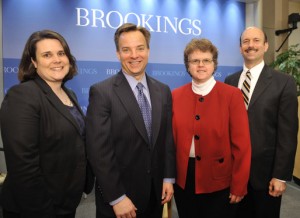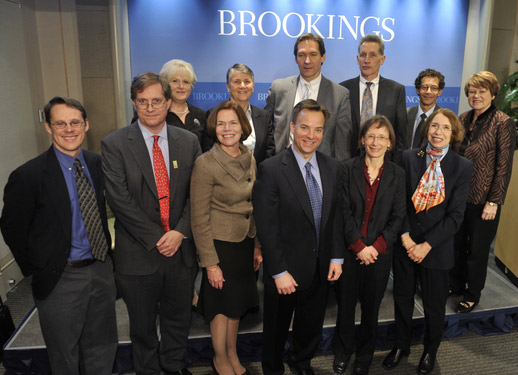Health reform may have stalled in Congress, but improving chronic care remains an urgent issue—perhaps more urgent than ever. So we at the Hartford Foundation were delighted with the strong turnout at the symposium we sponsored at the Brookings Institution in partnership with our colleagues at the Scan Foundation last week: “Health Care Reform and Older Americans: Achieving Better Chronic Care at Lower Costs.” The meeting was among the most well-attended Engelberg Center for Health Reform convenings held at the Brookings Institution, with more than 200 people in attendance and over 400 more joining via webcast.

Mark McClellan, director of the Engleberg Center, convened leading experts on key payment reforms, quality measures, and evidence-based approaches that improve chronic care. Improving cost, care quality, and quality of life for the 20% of the population that drives 80% of health care spending will require solutions that include and extend beyond the medical community to help people make better, more coordinated use of available resources.
Kathy Greenlee, U.S. Assistant Secretary for Aging, challenged colleagues to leverage the home and community-based services provided under the Older Americans Act (up for renewal in 2011) and strive for “the best way to get together the social support and chronic care support and the medical support--sort of the merging of the medical model and the social model.”
Diane Meier, Director of the Hartford Foundation-supported Center to Advance Palliative Care, said it best, describing the tragic disparity between the care nursing home residents would like to receive and the actual care that regulations and financial incentives push the system to deliver. “[Families] want recognition of the personhood of the resident, even though they are cognitively impaired,” said Meier. “[They want] attentive and loving personal care with continuity, more time and attention from doctors, and they want consistent caring relationships. We’re not measuring or paying for or rewarding those things.”

Finally, innovations in Medicare must move forward now. Thanks to the work of many of the Hartford grantees who attended the conference, we have a wealth of evidence and examples that can show the way to improving quality and reducing costs for people with multiple chronic conditions. It is essential that the federal government address financing barriers in order to make proven medical or health home models like Guided Care and Care Management Plus readily available to older adults with multiple chronic conditions, as well as proven programs that address care transitions like those developed by Mary Naylor and Eric Coleman. These can greatly reduce hospital readmissions for the frequent fliers of the health care system.
Getting innovative programs to become the standard will require flexible thinking and cooperation on all sides. As David Reuben, chief of the geriatrics division at the David Geffen School of Medicine at UCLA and a longtime Hartford grantee, described the sort of obstacles that prevent doctors from implementing new ideas–such as learning to work in teams, adopt electronic medical records, and acquire unfamiliar geriatric competencies–he stressed the need to be realistic, but declared himself optimistic: “All forces are aligned. [There are] some stumbling blocks, but the work of today is the promise for the future.” He also stated what was probably a universal sentiment: “They’d better get this straightened out before I get old.”
A follow-up paper will be available soon at the Brookings Institution website as part of our effort to share the recommendations from the symposium more broadly. Additionally, you can watch the entire proceedings here.
We of course want to thank our own Christopher Langston and the Scan Foundation’s president, Bruce Chernof, for their outstanding contributions to the discussion. Dr. Mark McClellan and his staff at Brookings orchestrated a stellar convening that offered significant new insights into the national conversation on payment and quality. Here’s to the future of chronic care!
